#creation of life
Text
One massive, legitimate way to improve as a writer or artist or in any creative endeavor really, is to become absolutely obsessed with something and to allow yourself to be weird about it. Genuinely mean this btw.
#dc comics#disco elysium#shakespeare#hamlet#scott pilgrim#<- all this things have made me a better#writer and artist for both fan creation#and for my own original work#literal life hack#allow yourself to become obsessive and cringe to a certain degree#birdy chirps
54K notes
·
View notes
Text

if y’all see this floating around: yes, it’s from me, and yes, you can find the original post on hoyolab under the same user <3
#fuck ai#gacha life 2#gacha club#gacha life#procreate#ibispaintx#clip studio paint#picrew#art#memes#ai users dni#i don’t support ai#fuck off#my creation
11K notes
·
View notes
Text
Why Did God Create Everything?
The Scripture is clear that God created the physical universe, the earth, and all life on it, including humanity. But it is less clear just why he created it all. This article is an attempt to provide an answer to that question. Why did God create?
The why of creation and God’s purpose in creation are two distinct but related questions. The question of God’s purpose in creation has to do with…
View On WordPress
#Big Bang#Creating Heaven On Earth#creation#creation of life#God#Gods goals#Gods motivation#Gods purpose#Gods vision#science#why did god create everything
0 notes
Text


June, 1936
Journals of Anais Nin 1934-1939
[volume 2]
#anais nin#june#literature#self creation#magical living#life by design not by default#words#quotes#academia#dark academia#quote#lit#books#books and libraries#self care#reading#quote of the day#self love#bookworm#book quotes#prose#booklr#bibliophile#excerpt#light academia
5K notes
·
View notes
Text
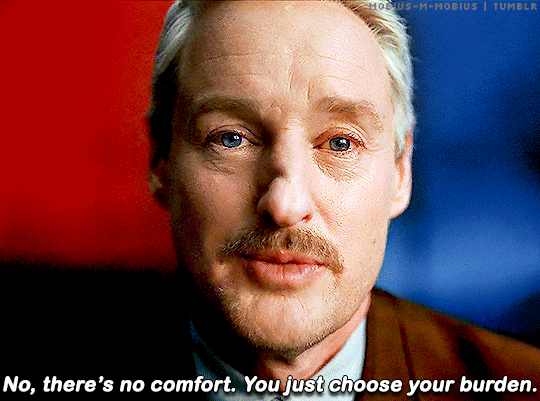



#the Nowhere Man who waits and the God of Stories who watches
#mobius#loki#lokius#mcuedit#lokiedit#marveledit#loki spoilers#owen wilson#tom hiddleston#owenwilsonedit#marvel#dianagifs#😩😭#what... in the most tragic of romances did i just witness#gotta rewatch tomorrow but cannot BELIEVE how okay i am with everything atm???#their story clearly isn't done their burden is obviously going on without each other and they exist fundamentally connected#they've lost everything but being able to see mobius every step of the way is enough for loki to make the sacrifice#and mobius left for his timeline with no other purpose than to make sure loki could do just that#now they're lost without each other?? the only thing mobius can do is exist for a moment in loki's creation i'm UNWELL#god this is the star crossed angst that's gonna keep me going for the rest of my LIFE they're my everything#loki s2 spoilers
12K notes
·
View notes
Text
if you ask me. being a good storyteller and love are inherently entwined. you cannot tell a good story without loving the people in it and loving those you tell it to. because to tell a good story is to understand it and its impact. to love is to understand how something moves through others and how to deliver it the way it would be best received. and how to breath life into something that did not exist before. storytelling is an act of creation sure but i do believe in all creation, there is love too. that there must be
#this is also sort of how i see/think about god#that if god isnt real. well then thats fine#god is the meaning we give to life. because as human beings we give things meaning. simply because we are humans and thats what we've alway#done. that could be god to me#but the other thing that could be 'god' is the idea that everything here is made with intention#not with the intent to control the outcome of the universe or the people within it but#with the intention to make something. and i do think that creation intention and love are inherently intertwined#txt#scratchpost
4K notes
·
View notes
Text
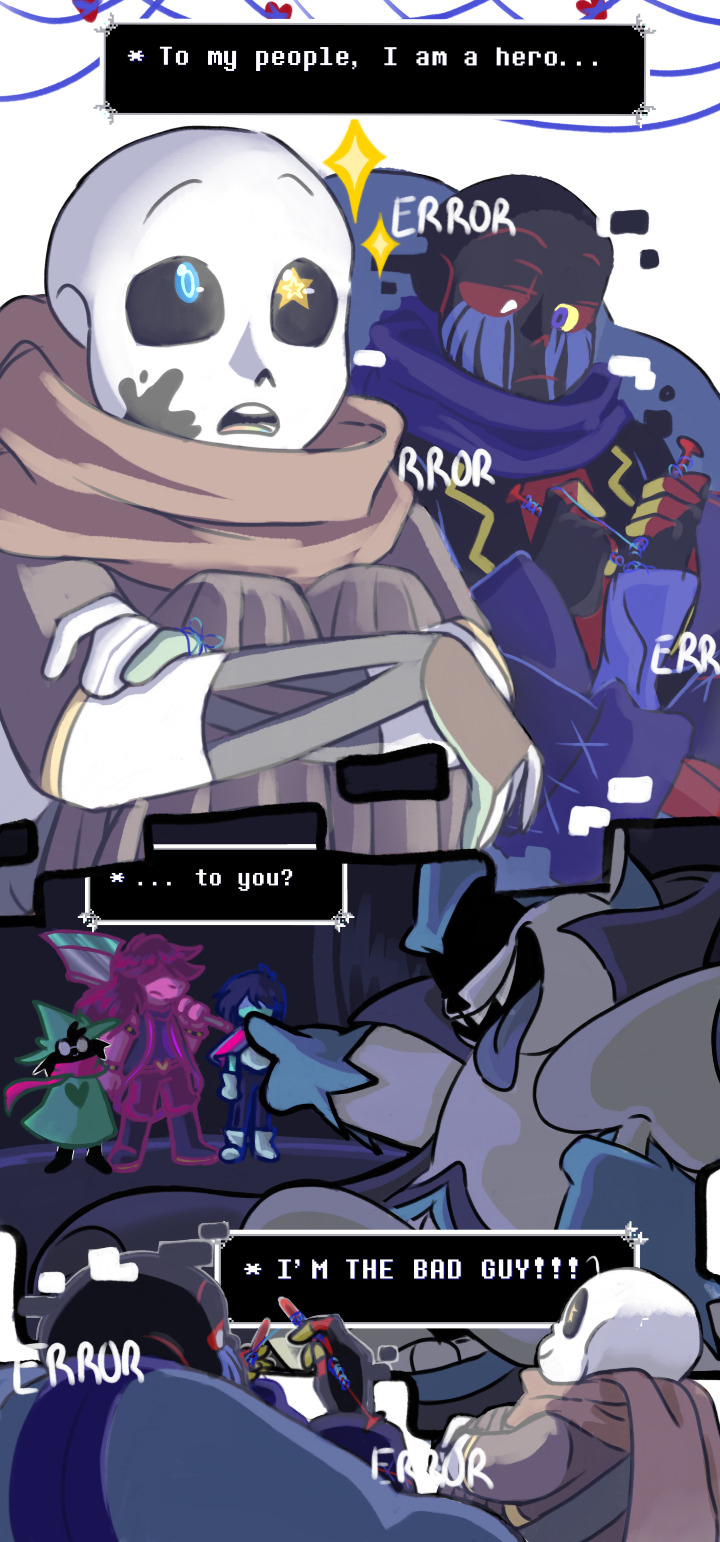
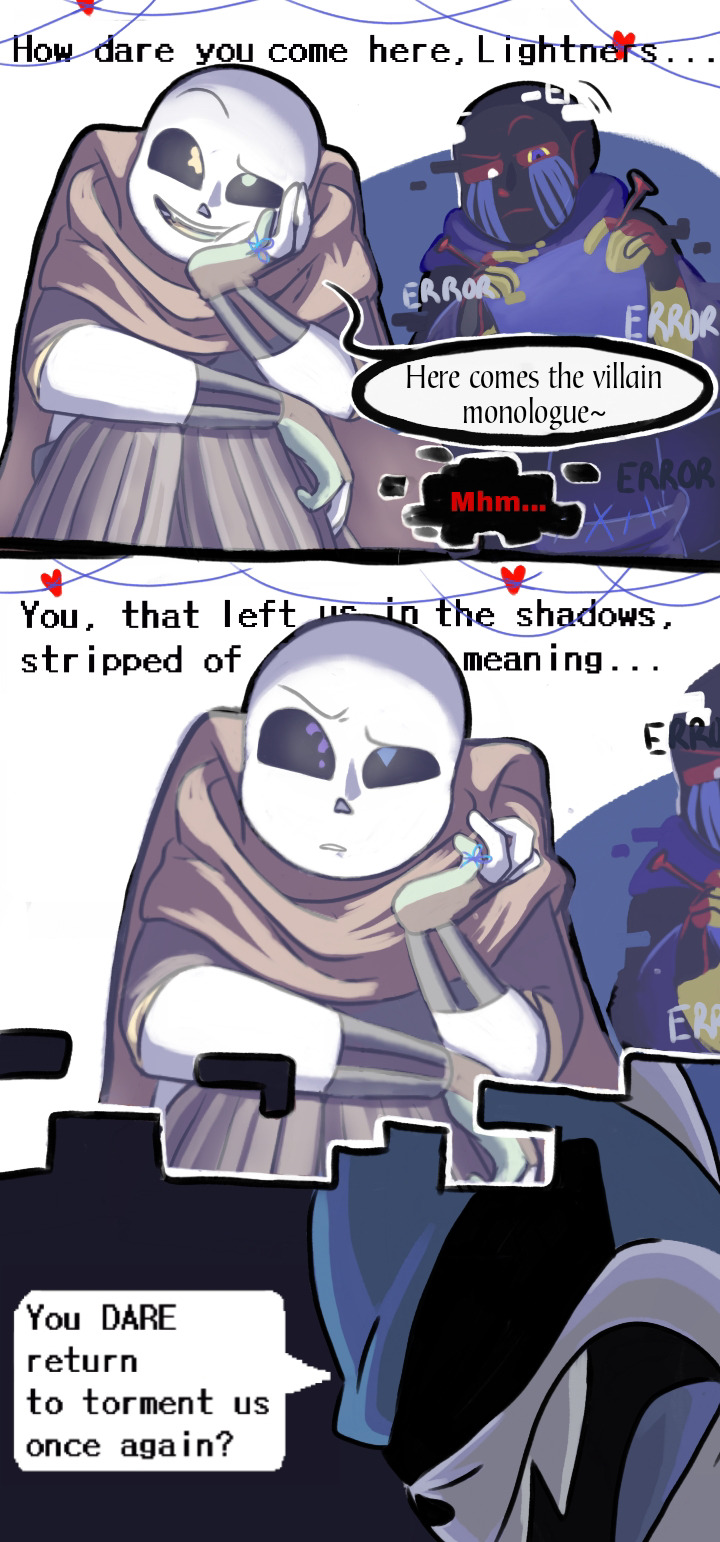

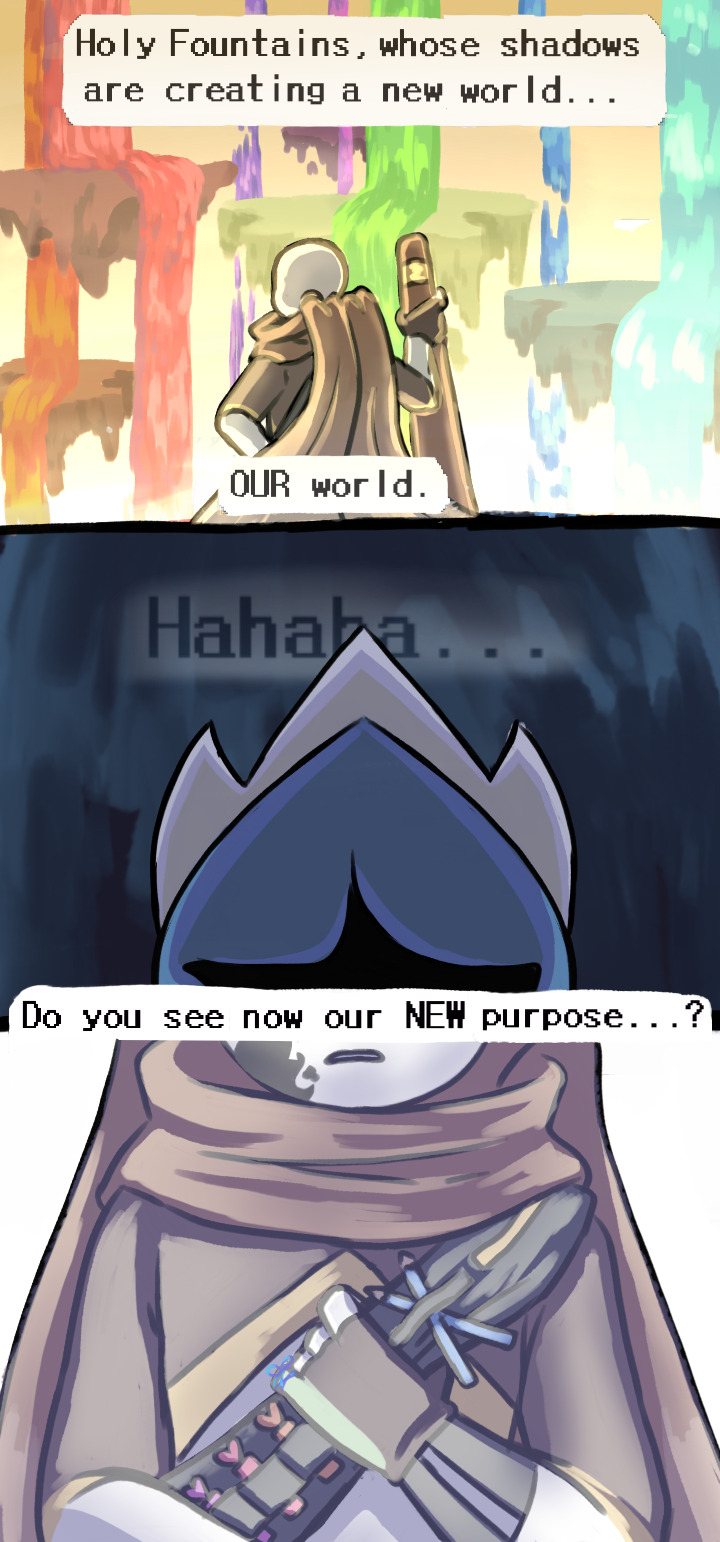
[Abandoned by the Lightners, his heart became cracked with hatred.]
Hitting a lil' too close to home?
#junie art post#ink sans#error sans#utmv#errorink#implied. but yea not the focus#this has been turning around in my mind for quite some time. im glad to finish it lmao idk if my ramblings make sense even.#so like listen. do you ever think about how similar the function of the utmv is to the dark worlds in deltarune.#in a meta narrative to fandom sense? idk the word#we are making exaggerated expanded worlds of the ordinary tools and entertainment of the real world and make it into something more#isnt that very very interesting?#and we explore every sort of possibility in that creation. both good and bad#and when all is said and done. every possibility found and the entertainment and secrets has all run out#we put it away. abandon and leave it behind#what is left? what happens to the world and characters we have created? can it sustain without us?#what of the ones left in the dark?#idk if yall saw me a few months ago but i reblogged comyet's old post of ink begging us not to leave him alone and to keep creating#yea that never left me#and seeing exactly THAT SCENARIO in deltarune made my brain iTCH#imagine an ink in King's position.... wait isnt that just underverse#mmmmmmm. darkner ink.....#also error is here too. not just for errorink or that i can't separate these two to save my life#but error is also one of the few people to be able to GET IT?? he can hear the creators too. ink cant#but hes pretty much programmed himself to avoid having a mental break down to this via reboot memory loss.#and ink has his own internal coping mechanism (hooray for short term memory loss)#these two idiots will do anything but confront truths lmfao#ahhh my favorite idiots. never change#mmmmm#deltarune
2K notes
·
View notes
Text

Welcome home
#artists on tumblr#cw blood#i really like drawing wings if it wasn't obvious#drawing has been rough lately though#all the A-I trash going around is so depressing to see#please pick up literally any tool in your hand and create#shape something with your own hands#breathe life into something#it doesn't need to look perfect and polished and photorealistic#literally anything any person has ever drawn with their own hands#has more value than every algorithm generated garbage put together#a vent doodle drawn in the math notebook of a 13 yo girl has infinitely more value#than any stolen blendered together soulless algorithm “creation”#we're humans we create#so just#create#with your own hands and your own ideas
7K notes
·
View notes
Text

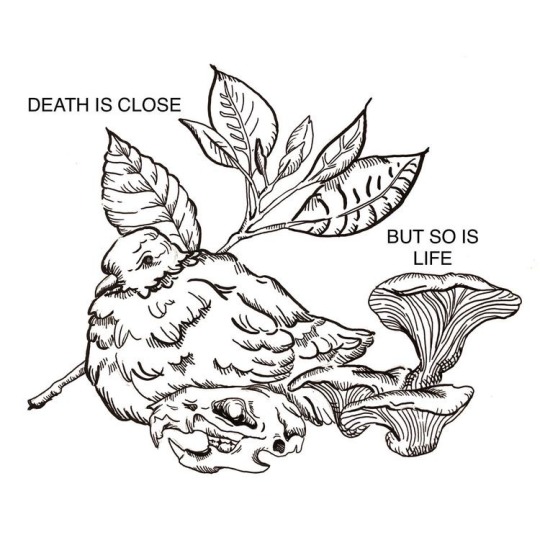


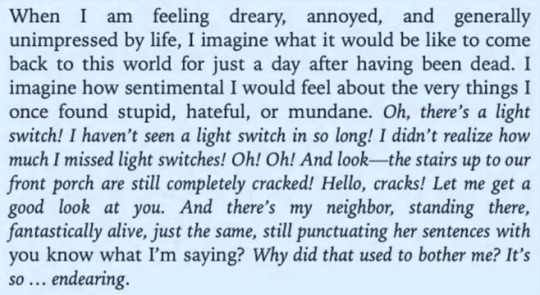



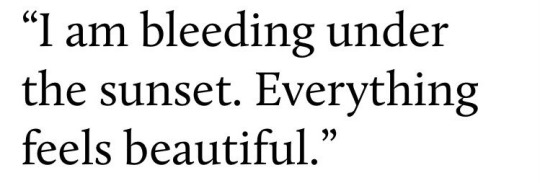
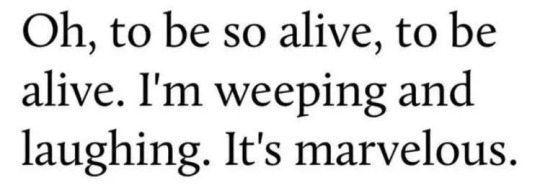
i am too in love with life, i don't want to die (i cannot fathom the absence of living)
arthoesunshine | sunlightafterdark | joseph cambell | mary oliver | amy krouse rosenthal | joseph brodsky | unknown | gregory orr | colette, tr by matthew ward | anaïs nin
#web weave#web weaving#on death#on life#on mortality#on hope#the self#poem#poetry#sunlightafterdark#mary oliver#amy krouse rosenthal#joseph brodsky#gregory orr#paradox creation
17K notes
·
View notes
Text
the void state is just another state of consciousness.



just as we are awake reading this post on our phones/laptops, we are aware of our surroundings and we are conscious of it. we are in a state of consciousness. the same is applied when we are conscious, but with 0 physical awareness. we remove our awareness/attention of what we are experiencing, and we are simply tuned into our thoughts— it is also a state of consciousness.
the void state is described as conscious with 0 physical awareness or pure consciousness. the void state isn't an otherworldly dimension, or a multiverse, or a different plane you're "entering". it's just another state of consciousness, meaning it's not something you try to get into, it's natural. also meaning that everyone can (and probably did) induce this state.
now, the "void" state is extremely easy to induce. as in, there are many ways to induce pure consciousness. however, the main way to induce this state is to detach from what you're experiencing/physically feeling. stop hyperfocusing on your surroundings and how your body feel and be in the moment with your thoughts. the only reason why some of us get "kicked out" of the void state is because our awareness is suddenly placed on our surroundings or our bodies. stay calm. you're literally fine. when you try to feel your body, you will tap out of the state because you're bringing awareness to what you're experiencing/physically feeling. that's why you must stay relaxed and still to stay in this state of consciousness.
now, because you are just consciousness in this state, logic and imagination are no longer separated. it's just whatever you identify as/affirm to be. logic is the result of the beliefs created due to the physical world's discoveries ingrained in our minds, such as, xyz is impossible, which may seem logical. hence why, regardless of how ridiculous your desire may sound, when you affirm for xyz while in the void state, the 3d instantly reflects it, becuz you're just being in imagination literally.
if it didn't manifest instantly, you weren't in the void state.
#b4ddprincess#void state#i am state#3d reality#4d reality#law of being#law of self#affirmations#no mind state#state of consciousness#pure consciousness#consciousness#law of manifestation#manifest#manifestation#3d#4d#identifying with imagination#imagination life is your creation#epiphany#void state epiphany
769 notes
·
View notes
Text

I have been sensing a theme to Martyn's characters as of late...
#mcyt#inthelittlewood#martyn inthelittlewood#martyn itlw#itlw#3rd life#new life smp#fantasy smp#also something something both of pow creations smps plotlines or endings have all had something to do with winter snow and ice#the rats leaving the mansion in the middle of winter whilst a blizzard is happening#andallmayormaynotdyingbecauseofhypothermiawearestillnotsureofthat#and pirates having that ice wall and probably some other stuff I still haven't fully watched it
1K notes
·
View notes
Text





BUFFY THE VAMPIRE SLAYER
6x03 | “After Life”
#btvsedit#btvs#buffythevampireslayeredit#buffy the vampireslayeredit#creations#buffyseries#spuffy#spike#buffy summers#buffysource#dailybtvs#after life may have my favorite spuffy scenes ever.#dont hold me to that but like fuck#this. the hand hold.#the 'every night i save you' speech later in this ep fucks so hard
1K notes
·
View notes
Text
Your Way Back
Your Way Back…
View On WordPress
0 notes
Text






THE RINGS OF POWER
1.08 "Alloyed" || 2.04 "Eldest"
#the rings of power#tropedit#ropedit#haladriel#saurondriel#tolkienedit#lotredit#tolkiensource#ringsofpowersource#lotrladiessource#ringsofpowerdaily#galadriel#halbrand#sauron#adar#rings of power#my creations#haladrielcentral#userbulbul#letthefairyinyoufly#girl is living her best life
439 notes
·
View notes
Text

Life's beauty is like a myriad of flowers, and I want to pluck the one that never wilts.
#hey ruanmei gang its me again. Ya boy#i love. LOVE. overgrown nature themes and seeing her lab with all t he fucking glass TUBES and PLANTS and everything so neat and tidy i#just wanna see it all UNRAVEL bro i want it FUCKED UP#i think abt ruan mei abandoning her creations the things she raised bc they dont serve a purpose for her anymore but the plants keep reachi#g for the sunlight right. so full of life regardless of if they feel or think or speak. just like ruan mei huh.#im running out of space ill talk another time#ruan mei#honkai star rail#honkai star rail fanart#cele draws
1K notes
·
View notes
Text
Avoiding therapy speak in writing
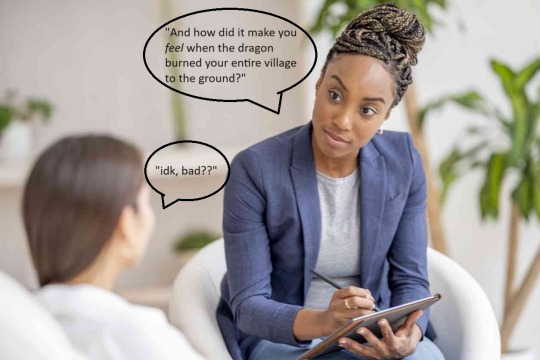
I think we all know by now that therapy speak is irritating and unrealistic, especially if you are writing in a fantasy world that doesn't even have modern psychology.
Part of the reason that it is so annoying is that it is the definition of telling instead of showing: characters are just plainly informing us of their feelings rather than making us work for a better understanding. It's cheap and boring. Instead of making your characters seem like complex individuals with their own hangups and difficulties, they seem like plot points programmed to tell us things.
But obviously, you want to put these people in situations and have them talk about it! How do you do that without sounding maudlin? Here are some options.
Listen to real arguments/conversations
I cannot stress enough how important it is to listen to how actual real human beings talk to each other during heightened emotional states. They don't have to be nasty abusers, and they don't have to be perfect angels, just everyday people doing their normal thing.
Of course, I'd hope you're not seeing people argue all the time, but if you do happen to see it, listen carefully and notice how people actually address their problems. Think back to tough conversations that you have had, even if you wouldn't classify them as arguments. Consider how people acted and reacted to one another. Notice how normal humans talk about issues outside of therapy, even intelligent and emotionally evolved people.
I've had years of therapy, and even I do not talk in therapy ways about my issues when I'm talking to my family or friends. It just feels cheesy and fake outside of that particular setting - plus, it freaks other people out and can seem kind of manipulative. Try talking like that in a real conversation and see how uncomfortable it is. You'll understand why avoiding therapy speak is important.
Consider the character's own hangups
Just as everyone has their own unique speaking style and mindset, so do we all have our own argument styles. These are often informed by our pasts and upbringing; they are as varied as our own histories. However, there are a few different options.
Someone with a happy upbringing may be more assertive and willing to address their problems because they had that demonstrated to them as children.
A spoiled child will grow up to be a demanding adult who refuses to give any quarter.
Those who got yelled at a lot as children may shut down and fawn to avoid getting hurt.
Someone who grew up in a violent household may mimic that behavior and get incredibly aggressive when upset.
Individuals whose parents didn't teach them emotional regulation will lash out and get loud.
Manipulative people may stay very calm and gaslight the other person, or they may get hysterical to garner sympathy and make people focus on comforting them.
Someone who has gone to therapy may revert to their original argument style, or they may imperfectly apply what they have learned in a way that feels a bit unnatural. They may start out with rage, then force themselves to calm down through grounding techniques.
People who have been coached through previous emotional outbursts could demand a time out, then fail to actually calm themselves down.
Some may refuse to acknowledge they are upset and insist, in increasingly forceful terms, that they are fine.
Others may get quiet or crack a joke to ease the tension, but it doesn't really help.
Keep each confrontation short
IRL, emotional confrontations are generally not that long. They don't go on for hours and hours, though it can feel that way. No one is going on and on about their feelings and sharing every little detail of how they feel (at least not that I know of personally, maybe other people are different).
Even the worst arguments I have had, the real nexus of the argument was maybe an hour or two, though the fallout lasted much longer. I'd say there was an hour maximum of real, active confrontation, preceded or followed by hours/days/weeks of simmering frustration.
Why? Because arguments are exhausting. You don't have the energy for that in the heat of the moment. Yes, feuds and fights can last years, but each actual confrontation is short.
For longer, more serious issues, hash it out over a few sessions rather than all at once. It's rare to get everything out of the way immediately unless the characters already have a strong, loving relationship.
Show incongruencies
Especially for more reserved people, they will likely have their emotions leaking all over the place but won't actually say anything. As such, focus on body language while keeping the conversation more focused on the plot. For example, Character A might be crying but still trying to argue their point about whatever is going on.
Address physical complaints instead of emotional ones
In many cases, people will use "I'm tired" or "I didn't sleep well" or "I'm not feeling great" as shorthand for whatever is actually bothering them. It relieves pressure by not making them talk about upsetting matters while still addressing their discomfort in some form.
You should also consider the fact that some people can't connect physical sensations to feelings, so they may genuinely feel ill and not really understand why. This is especially common in people who can't emotionally regulate or have been through trauma.
For myself, I tend to somatize my feelings, so I might not feel upset, but I will feel physically sick. My stomach will hurt, my chest will get tight, or I'll get a headache, but my emotional state will seem calm. This isn't all that unusual, and many people experience this to different degrees.
As such, you can have your character say that their stomach hurts, or that they have a headache and can't discuss this anymore, or that they need to go lie down because they're dizzy. If we know they're relatively healthy, this can be a clue that they're getting overwhelmed but either cannot pinpoint their emotions or don't want to discuss them.
Let characters advance and retreat
A lot of the time, someone will address a scary emotion and then retreat again, sometimes over a period of hours, days, or even weeks. This is normal: most of us don't have the emotional fortitude to forge ahead through something difficult all in one go. Character A may say something vulnerable, then change the topic, laugh it off, say they're done discussing it, or even leave the situation.
Leave emotions partially unaddressed
Again, it's rare for someone to spill out everything they're feeling all in one go. As such, have Character A address the most important thing - or the least important, depending on their level of emotional maturity - and let it be done for then.
They might say their small piece, but when someone tries to probe deeper, they don't have an answer, or they get "stuck" on that one emotional level and cannot go further.
If Character B keeps pushing, then they may get incredibly upset and push back, or retreat.
Have Character B point out the feelings
Works especially well if the other character is a close companion or a parental figure. Often, people who know us really well will have better insight into our emotions than we do. Or, we might have good insight into our emotions but are still too afraid to open up. Having Character B point out the issue gives Character A grace to be more honest.
I can't tell you how many times I've been really upset, so I've distracted from the issue by getting angry about something completely different. Then, my mom will gently point out that I'm not actually crying about my new plastic cup being broken or whatever; I'm actually upset about XYZ. In that moment, I realize I've been caught out and admit that yes, that's what I'm really upset about.
Have Character A address it with a third character
Who among us hasn't gone to someone else to talk about our feelings? Having a third party serve as a sounding board is normal. Sometimes, Character A will feel such catharsis from this conversation that they don't address it as thoroughly with Character B.
Of course, you can use this to your advantage and create more tension if the third character gives bad advice or is biased.
Remember that just because the third party responded well does not mean that Character B does. You also have to avoid omniscience and remember that Character B wasn't privy to that conversation.
Have one confrontation be a stand-in for a larger one
I always think about the "The Iranian Yogurt Is Not the Issue" post when I think about this. Often times, things like not doing the dishes or whatever aren't actually the big deal: it's lack of boundaries, communication, or respect. A minor argument can be shorthand for a larger one that is too challenging for the characters to tackle.
This isn't just creating drama for the hell of it, though; it's about exploring the larger issues without making the characters lay it out on the table. A good reader will be able to see it's not about the Iranian Yogurt as long as you set up the relationship well.
Currently, I am writing a story where Uileac and his sister Cerie go to rescue Uileac's husband, Orrinir. On the way there, Uileac idly comments on how he wonders where a waterfall comes from because he's trying to distract himself from thinking about the fact that his husband is kidnapped and possibly dead.
Cerie, being pretty wound up too, starts arguing with him about it because she's like "why is this relevant? We're kind of too busy to think about geology right now!" Uileac gets annoyed at her for being so aggro, and she gets annoyed at him for being so irreverent. Both of them are upset about something completely different, but they're too scared and panicked to actually address that, so they release their frustrations by complaining about waterfalls.
Those bad vibes have to go somewhere, but neither of them are very good at talking about their feelings (though very good at stuffing them down). As such, they take the pressure off by sniping at one another. You've probably done this too, when you get into a dumb argument about something absolutely pointless because there's something you don't feel strong enough to discuss.
There's also the fact that if you're mad at someone about something but feel it's too stupid or petty to discuss, that frustration will leak out and everything else they do will annoy you, leading to a bunch of irrelevant arguments.
Use "reaffirmation" gestures
I talked about this in a different post, but after an argument, the "make up" stage doesn't always involve going "ohhh I forgive you" and big hugs and kisses, especially when the two characters aren't emotionally mature.
Instead, Character A makes gestures that reaffirm the relationship. This could be offering to do something Character B needs, making plans for later, or changing the topic to discuss something the other character cares about ("how are your cats doing?") etc.
Note that these "reaffirmation" gestures aren't the same as the cycle of abuse. This is more when two characters have had a difficult emotional conversation but aren't really sure how to continue being emotionally open, so they revert to something safer that still shows they care. They're not over-the-top gestures either, but more a special attention to something the other person loves. Knowing what the other person loves also demonstrates the depth of their relationship.
As always, I can't tell you what to do with your writing.
You are the crafter of your own story, and if you want people to talk like therapists for whatever reason, that's your choice. However, we want characters to feel like real people, and most real people don't lay it all out on the table every single time they're upset. If they do, they might be trauma vomiting, which is icky in and of itself.
Healthy communication isn't always perfect communication. People can have strong, loving relationships and still get things wrong - we're human. Having people calmly and rationally and easily talk about their feelings every single time is not only kind of boring, but it also feels weird, because unless we're primed to discuss those difficult topics and know we're perfectly safe, we're not going to do that.
People don't even do that in therapy, where they are paying for the service of talking about their feelings! Therapists also don't always do that IRL!
We're humans, and your characters need to feel like humans as well. That means letting them be imperfect communicators and using context clues rather than making them do all the work for the reader.
If you liked my advice, consider purchasing my book, 9 Years Yearning, for $3!
#beginner writer#young writer#tumblr writers#writing advice#writing tips#on writing#writing resources#writers on writing#writing reference#writing stuff#writing things#about writing#character creation#original characters#ocs#original writing#writers on tumblr#creative writing#writerscommunity#writeblr#writing community#writers of tumblr#writer stuff#writer#writers life#writer things
454 notes
·
View notes